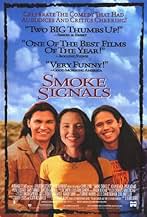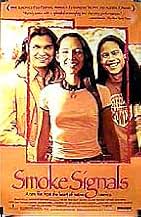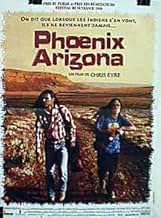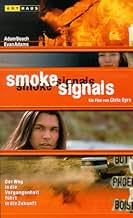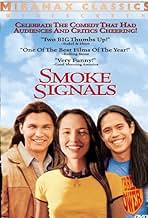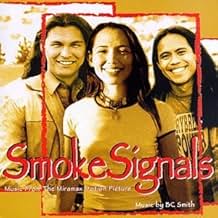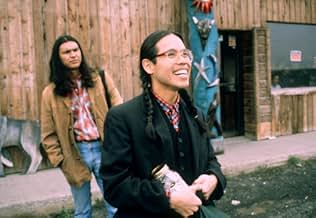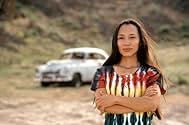Le 4 juillet 1988, le jour de la fête d'indépendance des Blancs, après une nuit de beuverie, Arnold Joseph monte dans sa camionnette jaune et disparaît à jamais, laissant derrière lui sa fem... Tout lireLe 4 juillet 1988, le jour de la fête d'indépendance des Blancs, après une nuit de beuverie, Arnold Joseph monte dans sa camionnette jaune et disparaît à jamais, laissant derrière lui sa femme Arlene et son fils Victor.Le 4 juillet 1988, le jour de la fête d'indépendance des Blancs, après une nuit de beuverie, Arnold Joseph monte dans sa camionnette jaune et disparaît à jamais, laissant derrière lui sa femme Arlene et son fils Victor.
- Prix
- 15 victoires et 8 nominations au total
- Lester Fallsapart
- (as Leonard George)
Avis en vedette
Although it is an independent film and produced entirely by an ethnic minority, the plot for this film is fairly straightforward and not anything that is worth hunting out just for that. However it is the delivery, writing and charm of the film that makes it worth seeing and makes it as enjoyable and engaging as it is. Never taking itself too seriously and even poking fun at the ethnic stereotypes we would expect to have found the film's charm relies heavily on its characters to bring it off. The natural writing helps and produces dialogue that flows convincingly even when the story isn't all you could have hoped for. The direction is equally as assured and aids the film by giving the whole thing an accessible and down to earth story.
The cast are a strange mix of people I've never seen and Indian actors who are in everything. Beach is impressive and natural and he makes his character more than just a jock sort of role. Likewise Adams is enjoyable even if he is a little annoying and he is more than just a geek. Bedard is as charming as the film itself and is gorgeous with it she carries a lot of the emotional weight of the film and she does it well. Farmer is a presence as usual and does well in flashback while support from people like Skerritt adds something if not a lot.
Overall this is not a flawless film but it covers any problems by being charming and enjoyable. The cast take to the writing and deliver natural and likable characters who become the focal point of the film and carry the audience along. Sure it pushes all the "quirky independent film" buttons but it is no less enjoyable for it.
The premiere was at an old, Egyptian-themed cinema in Seattle and the house was half full for the 4:30 matinee. The audience was predominately Native American.
On exit, Sherman stood on the sidewalk in the late afternoon Seattle light and waited nervously like a child, to see the reaction to the film (which had ended with unanimous applauds from the half house audience). A film crew was there for exit polling.
A diminutive Native American female elder slowly approached Sherman. She moved forward and extended her arms around him into a hug and spoke softly, "Thank you."
Sherman was mush.
Don't miss this film. He's not 'the Spike Lee of Native American film making' as the Time Magazine of that week put it. He's an independent, regional film maker, whose background is the 'Rez.'
I thought it was going to be a plot less road movie, but it turned out instead to be about family and had a very specific story and plot line that avoided clichés. In that way it reminded me of the New Zealand "Once Were Warriors" - with about 1% of that violence about aborigine families struggling to have dignity within the confines of a white-restricted world. Like that movie you virtually don't see whites at all.
I very much liked how the flash backs were handled (in the context of "the past is never dead, it's never even past" type evocation). The title is used for several layers of meanings about smoke and fire.
Dar Williams's road song was used in an ironic road way, but I think it was added on afterwards. The passenger is bopping along to the song on the radio saying over and over that it's her favorite song, which would be odd for an obscure song. But the joke is also that the car can only go in reverse.
John Trudell (he's the DJ at KREZ) and Elaine Miles ("Marilyn" from "Northern Exposure") have teeny parts. The music is appealing --though none by Trudell and very little traditional. The closing credits have a Walala (the trio with Rita Coolidge and sister) tune that I thought it would be cool if it got nominated for an Oscar, if it's not previously recorded, as I thought it would be something different at the Academy Awards. The other music mostly also comes ostensibly from KREZ and is by Native Americans but in the singer-songwriter mode (no Bill Miller used). Other than Ulali (I thought was Walela, but I was corrected) and Dar when I tried to read the credits as they quickly went by I didn't recognize any of the names.
I almost immediately caught "Powwow Highway" on cable and was surprised to see how much it must have influenced "Smoke Signals" as a Native American road movie.
(originally written 7/2/1998)
More than anything else, this movie appealed to me as a writer. Taken from Sherman Alexie's brilliant collection "The Lone Ranger and Tonto Fist Fight in Heaven". it is beautifully written and expertly crafted from beginning to end. The first scene, narrated lyrically by Evan Adams as Thomas Builds-the-fire, sets the tone for a story handed down, as with Native American culture, in true oral tradition.
The French title, Le secret des cendres (The secret of the ashes) more accurately describes the book and the movie, both of which must be experienced to fully appreciate Alexie's genius. With multiple allusions to fire and ash, each having different meanings, as well as a well integrated use of Native American lore, Smoke Signals requires more than a little thought for the average American viewer.
The story revolves around two young Coeur d' Alene Indian men dealing with loss and the end of childhood innocence. The two men cope with loss in very different ways; Thomas though mysticism and legend, Victor through stoicism and denial. When Victor Joseph, brilliantly played by Adam Beach, learns that his estranged father has died, he and Thomas embark on a journey to claim the ashes, another allusion of the french title, and on the way get in touch with their identities as adults apart from their parents.
Evan Adams is stupendous as Thomas Builds-the-fire. His storytelling scenes are pure magic. By imbuing simple memories with mystical reverence, he elevates them, and thus both himself and his listeners, to a new spiritual level. His exaltation of the ordinary is the core of this delightful work of genius. It culminates with a reading, slightly modified, of Dick Lourie's poem "Forgiving Our Fathers". Lourie, who is a self-described unreconstructed beatnik poet, brings a fragile and elegant beauty to the film's emotional climax. The final scenes, driven by Adams' narration and haunting Native American chant and music, are nothing short of miraculous.
Adam Beach, strapping and stalwart as Victor Joseph, managed to parlay his appearance in Smoke Signals into a respectable film career. Evan Adams, diminutive and shy as Thomas Builds-the-fire, was not so lucky despite his masterful performance. Perhaps Admas' aspirations ran along different lines, as these days, even after starring in what is basically a sequel (The Business of Fancydancing, also by Alexie) Adams can now be called Dr. Adams, as he has become a respected and accomplished physician in British Columbia.
The supporting cast was equally magnificent, and each lends credibility and energy to the movie. An interesting sidenote is that Irene Bedard, who appears as Suzy Song, was the physical model for Pocahontas in the Disney animated feature.
I have seen this movie many times, and will undoubtedly watch it many more. Each time I am left in silent awe as I reflect on my own life, family, and philosophies.
Le saviez-vous
- AnecdotesThe first movie to be written, directed, and co-produced by Native Americans.
- GaffesThere is no way that one bus driver could have driven the same bus continuously from Idaho to Arizona. Federal law would prohibit it.
- Citations
Thomas Builds-the-Fire: How do we forgive our fathers? Maybe in a dream. Do we forgive our fathers for leaving us too often, or forever, when we were little? Maybe for scaring us with unexpected rage, or making us nervous because there never seemed to be any rage there at all? Do we forgive our fathers for marrying, or not marrying, our mothers? Or divorcing, or not divorcing, our mothers? And shall we forgive them for their excesses of warmth or coldness? Shall we forgive them for pushing, or leaning? For shutting doors or speaking through walls? For never speaking, or never being silent? Do we forgive our fathers in our age, or in theirs? Or in their deaths, saying it to them or not saying it. If we forgive our fathers, what is left?
- Générique farfeluAny similarity to actual persons, living, dead, or indigenous, is purely coincidental.
Meilleurs choix
- How long is Smoke Signals?Propulsé par Alexa
Détails
Box-office
- Budget
- 2 000 000 $ US (estimation)
- Brut – États-Unis et Canada
- 6 745 362 $ US
- Fin de semaine d'ouverture – États-Unis et Canada
- 43 574 $ US
- 28 juin 1998
- Brut – à l'échelle mondiale
- 6 745 362 $ US
- Durée1 heure 29 minutes
- Couleur
- Mixage
- Rapport de forme
- 1.85 : 1
Contribuer à cette page



